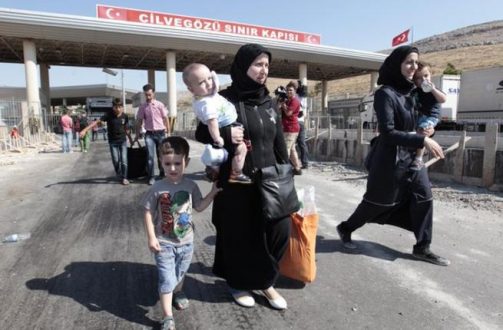Millions of Syrians call Turkey home. An economic crisis is turning them into scapegoats
Bahaa, who asked to be identified only by his first name, has lived in fear since Turkish authorities announced a crackdown on refugees who are not registered to live in Istanbul.
On paper, not much has changed for the more than 3.6 million Syrians in Turkey. They are still eligible for “temporary protection” — a quasi-refugee status that grants Syrians the right to be in Turkey, albeit without the full scope of rights articulated in international conventions on refugees.
But in Istanbul, refugees now face tighter controls. Syrians who registered for temporary protection outside of Istanbul have to leave the city by August 20 and return to their province of registration. Those who have no paperwork are still eligible for temporary protection but they have to leave Istanbul and register in a different Turkish province.
The announcement has sent a chilling message to Syrians like Bahaa. He will likely lose his poorly-paid job in a textile workshop, as he will have to travel to another city to get registered. But that, he says, is better than getting caught and being sent back to Syria. Bahaa says that if he returns to Syria, he “will lose everything and die.”
Ankara categorically denies it has a policy of deporting Syrians. The government says it will facilitate “voluntarily returns.” But some who have already been returned to Syria, say they were coerced into signing the “voluntary return” paperwork.
Amr Dabool was caught by the Turkish coast guard while trying to travel to Greece by boat. He was eventually taken to a holding facility. “There were many Syrians in the prison, some of them spent a full month refusing to put their fingerprint on the papers but eventually they surrendered and so did I. I had two choices. First is to be in jail for a very long time. The second one is to get deported, and I chose to be deported,” he says.
Amr has since smuggled himself back to Turkey and is waiting to attempt crossing into Greece again. “I will keep trying until I make it there, there is no way I am going to live in Syria or Turkey, this is my goal…I won’t stop until I make it,” he says.
Ankara insists it is enforcing existing regulations, fighting illegal migration and trying to cope with the largest refugee population of any country in the world.
Turkey continues to register Syrians outside of Istanbul and gives them some access to healthcare and education opportunities in other provinces. But resentment toward Syrians has been growing across the board in Turkey.
Economy in trouble
Turkish president Recep Tayyip Erdogan says the government has spent more than 37 billion dollars hosting Syrian refugees.
That has become a hard sell for Turkish taxpayers during an economic downturn. Turks are struggling with the soaring cost of living and high unemployment, and Syrians have become an easy scapegoat for their economic woes.
Turkish social media is rife with unsubstantiated claims, with some suggesting that Syrians have priority over Turks at public hospitals and receiving government pensions. The government and NGOs have tried to refute these claims with public awareness campaigns. But anti-Syrian sentiment persist.
Election loss
More than half a million Syrians live in Istanbul which is the flash point for the new crackdown. The city just elected a new mayor, a centrist from the main opposition, in a blow to Turkey’s ruling Justice and Development Party. While the mayor has no enforcement power over the refugee issue, his campaign picked up on growing public dissatisfaction.
In a recent poll, the number of Turkish citizens content with living in the same city as Syrians fell from 72 percent in 2016 to 40 percent in 2019. The mayor’s campaign hammered home the message that the ruling party had mismanaged the issue of Syrian refugees and existing policies have failed Turks and Syrians alike.
Here to stay
The reality is setting in that Syrians could stay in Turkey for the long term. But there is still very little planning for their integration into Turkish society.
Syrians make up 81 percent of the population in the border town of Kilis and 434,000 Syrian babies have been born across Turkey over the last 8 years, according to government statistics. However, the idea that Syrians are “guests” to be welcomed with Turkish hospitality is wearing thin.
Turkey is polarized. When the government first made the announcement about refugees in Istanbul on June 22, some Turkish NGOs organized demonstrations in solidarity with Syrians. But at the same time, hashtags like #suriyelileriistemiyoruz or “we don’t want Syrians” began trending on Turkish twitter.
The recent tensions in Istanbul may be the starting point of more trouble ahead. No matter what the developments are in Syria, it is unrealistic to imagine that all 3.6 million Syrians will ever return to their homeland. Ankara has long held out hope of establishing safe zones along the border where Syrians can return.
Until Turkey comes up with a plan that is comprehensive and built on the idea that Syrians are and will continue to be a part of Turkish society, the situation will remain precarious. Turkey and neighboring countries have shouldered the collective responsibility of hosting Syrians in their time of need. It wouldn’t hurt if the rest of the world rolled up their sleeves and helped out.
The views expressed in this article do not necessarily reflect the views and editorial stance of the SOHR.
Source: Millions of Syrians call Turkey home. An economic crisis is turning them into scapegoats – CNN

